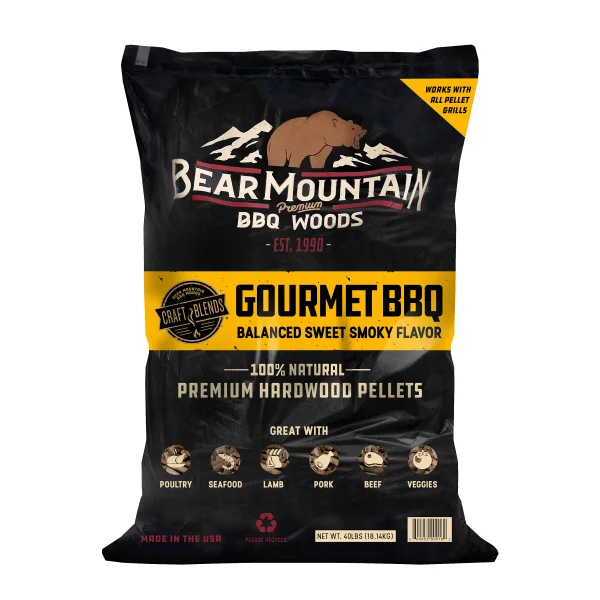
If you’re on the hunt for high-quality wood pellets for heating or grilling, Bear Mountain Wood Pellets come up in a lot of conversations. Since the company got its start in the Pacific Northwest back in the early ‘90s, Bear Mountain has earned a pretty good reputation for consistent quality and a range of options for both pellet stoves and wood pellet grills. You’ll spot these pellets at many hardware stores and grill shops, and plenty of backyard smoking enthusiasts swear by them.
I’ll break down what I know about Bear Mountain Wood Pellets, hitting all the basics, plus giving you extra info on the pellet types, how they’re made, and what sets them apart for both heating and outdoor cooking.
Product Name: Bear Mountain Wood Pellets
Company Website: BearMountainBBQ.com
Types Available: BBQ Grilling Pellets, Heating Pellets
Typical Bag Size: 20 lbs (BBQ), 40 lbs (heating)
Price Range: $7 to $25 per bag, depending on pellet type and retailer
Based in: Pacific Northwest, USA
Pellet Material: 100% hardwood blends and single species offerings
Best For: Pellet grills, smokers, and pellet stoves
Where to Buy: Available online at the official shop, at Amazon, and at major home improvement retailers like Lowe’s and Home Depot.
Bear Mountain offers a pretty wide range of wood pellets, from blends that suit all purpose cooking to more specialized single wood offerings like hickory, maple, and apple. They also produce heating pellets for pellet stoves, which are popular in colder climates and cabins.
Unlike some big box brands, Bear Mountain claims its pellets are always made without artificial binders, glues, or added oils. That’s really important if you care about the quality of smoke flavor and keeping things clean burning for indoor heat. Their bags are easy to spot, usually with a mountain outline and color coded for the type of wood inside.
Company Background: Who Makes Bear Mountain Wood Pellets?
Bear Mountain Wood Pellets is part of Lignetics Inc., one of the biggest wood products companies in North America. Lignetics has been around for decades, making not only wood grilling pellets but also heating pellets and wood based products like fire logs and animal bedding. Bear Mountain specifically focuses on supporting the outdoor cooking trend and high-quality pellet heating needs.
The company mills most of its pellets in the Pacific Northwest, an area known for dense hardwood forests. That gives them good access to raw materials for both hardwood and fruitwood pellets. Bear Mountain’s focus is on using clean, responsibly sourced wood, often from kiln dried sawdust, which is a pretty handy way to keep moisture content low and give you more consistent combustion in both grills and stoves.
I’ve seen Bear Mountain work closely with barbecue communities, sponsoring events and sharing recipes. They keep their formulas pretty simple, with a philosophy of high heat and low ash as their targets.
What Makes Bear Mountain Wood Pellets Stand Out?
People often ask what makes one pellet brand different from another. In Bear Mountain’s case, a lot of folks point to these things:
- Wide Selection: You can grab all purpose blends, classic BBQ flavors (like hickory, mesquite, and apple), or more unique options like cherry or pecan. For heating, they offer hardwood blends that give steady heat with less ash build up.
- No Fillers or Additives: The company advertises its BBQ pellets as all natural hardwood, with no glues, oils, or flavor sprays. You’re getting wood smoke only, which is really important for food safety and flavor consistency.
- Reliable Burn Rate: Consistent burn means less temperature fluctuation when grilling or heating a cabin. The low moisture, fine grind, and dense pellet structure seem to help with a steady cook or heat cycle.
- Good Value: While not always the cheapest, Bear Mountain usually sits in a midrange price bracket. The 20 lb bags go a long way, making pellets less expensive per cook compared to some “gourmet” boutique brands.
Pellet Options: Cooking Pellets vs. Heating Pellets
BBQ Grilling Pellets
Bear Mountain’s BBQ pellets focus on pure hardwood flavor and flexibility. Here’s what I’ve found in their typical lineup:
- Gourmet Blend: A multiwood mix (often hickory, maple, cherry, apple) that’s mild and works well with almost anything; poultry, beef, fish, even veggies.
- Hickory, Mesquite, Apple, Cherry: Each of these uses mostly the featured wood, sometimes blended with underlying oak or maple for better burn. Hickory is best for classic barbecue, apple for pork and chicken, mesquite for bold smoke flavor.
- Pecan and Other Specialty Woods: These don’t always show up year round, but they’re great for experimenting with new flavors or adjusting your smoke profile.
All their BBQ options are food grade, meaning they’re safe for direct cooking and don’t contain chemical binders. Pellets are uniform in size, helping eliminate clogs or jams in most popular grill models.
Heating Pellets
Heating pellets by Bear Mountain are sold mostly in larger 40 lb bags and designed specifically for use in pellet burning stoves and pellet fireplaces. These aren’t flavored or food safe for grilling, but they burn clean, hot, and pretty efficiently.
- High BTU Output: Bear Mountain heating pellets generally have high BTU values, which means they heat your space faster using less fuel.
- Low Ash Production: This feature limits stove cleaning time and reduces wear on stove components.
- Available at Retailers: I’ve found these bags at home stores and some bulk supply shops, especially in colder regions.
How Bear Mountain Pellets Are Made
The base of good pellets, whether for heat or grilling, is quality sawdust. Bear Mountain starts with clean, kiln dried sawmill waste, mostly from trusted forestry sources. The wood is ground to a consistent size and pressed under high pressure through a die (sort of like an extruder for Play Doh), forming those familiar pellet shapes.
No extra binders are needed, since lignin, a natural compound in wood, helps the pellets stick together when heated and pressed. That’s why good pellets stay solid until they burn, then turn to a light ash. Moisture content is kept super low (usually less than 6 to 8%) to keep the smoke clean and make sure you don’t get steamy smoke that can ruin food or corrode stove parts.
The end product is cooled, checked for consistency, and bagged up. Their packaging has clear markings for grilling versus heating, so you don’t accidentally toss flavored pellets in your stove or vice versa. All the manufacturing happens in carefully regulated plants. This helps Bear Mountain guarantee the uniformity of their pellets, bag after bag.
Grilling With Bear Mountain: My Experience
I’ve used Bear Mountain’s Gourmet Blend and Apple pellets in both a Traeger and a Camp Chef pellet grill. Here’s what I’ve noticed every time:
- Even Burn: The temp holds steady, even on lower “smoke” settings, so you don’t have to keep fiddling with your settings all through a longer cook.
- Smoke Flavor: With no oily residue or chemical aftertaste, smoke flavor is natural and not overwhelming. Hickory and Mesquite are strong enough for brisket, while the Apple is nice and mild if you’re cooking chicken or pork chops.
- Cleanliness: There aren’t a bunch of fines or wood dust in the bag, always a plus, since that stuff clogs the auger. After a long cook, I see very little ash in my grill. That means less cleaning, less time spent scraping things out later.
The pellets are really consistent in size, which means they autofeed well in gravity fed smokers and smaller tabletop pellet grills. They’re also dense enough that I get a longer cook per pound compared to softer, low quality pellets I’ve tried in the past.
Key Features Worth Noting
- Available in Convenient Sizes: For BBQ, most bags are 20 lbs, making them easy to store and lift. Heating pellets come in 40 lb bags for longer use.
- Responsibly Sourced: Bear Mountain says it sources wood from managed forests and sawmill byproducts, which helps cut waste and promotes better forestry practice.
- Low Moisture Design: You don’t need to dry these out; just dump them in the hopper. That really helps with ignition and smooth feeding.
- American Made: All Bear Mountain products are made and bagged in the USA. That’s a plus for folks who want to support domestic manufacturing and avoid overseas inconsistencies.
What People Are Saying
Looking through reviews and talking to other grillers, Bear Mountain gets high marks for taste, reliability, and affordable quality. Heating pellets are often mentioned in North American stove forums, with users saying the pellets burn hotter and cleaner than store brand generics. Barbecue fans like the lower ash and mellow smoke profile, while chefs appreciate the variety of wood flavors for more recipe flexibility.
The only real complaints I’ve seen are from folks who want very specific wood only pellets (like 100% pecan), since most brands, including Bear Mountain, add oak and other hardwoods as a base for steadier burn. For the money, though, Bear Mountain seems to hit a sweet spot between price, quality, and flavor consistency.
Tips for Getting the Most Out of Bear Mountain Pellets
- Store Them Dry: Even though the pellets come with low moisture, you’ll want to keep them sealed to avoid lumps, especially if you’re in a humid area.
- Try Blending: Mixing different Bear Mountain blends can help you create your own signature flavor profile for grilling or smoking. Gourmet plus Cherry, for example, gives a mellow smoke that’s great for roasts or turkey.
- Watch Your Hopper: Pellet grills feed best if the hopper stays at least half full. If you run low, the auger might push air, which messes with even heating.
- Clean Regularly: Since Bear Mountain pellets produce low ash, you won’t have to clean as often, but checking the firepot and ash pan every few cooks keeps your grill or stove running smooth for the long haul.
Final Thoughts
Bear Mountain Wood Pellets are a reliable pick for anyone serious about grilling, smoking, or heating with pellets. They nail the basics, with a clean burn, good heat, and no weird flavors. You get a variety of blends and pure wood options for different needs. The company’s roots in sustainable sourcing, North American manufacturing, and consistent quality control make these pellets worth checking out whether you’re just starting out or have been cooking over pellets for years.
You can find Bear Mountain at lots of mainstream retailers and online, which makes it easy to try a single bag or stock up for the cold months or your next backyard cookout. For anyone looking for a convenient, high-quality way to get even heat and satisfying smoke flavor, Bear Mountain makes the shortlist.
If you’re new to pellet grilling and still trying to track down the best wood pellet for your specific setup, Bear Mountain is a dependable place to start. Veteran backyard chefs might also enjoy mixing their blends with other brands for a signature flavor, though Bear Mountain’s solid lineup covers most bases right out of the bag. Ultimately, the consistent quality, easy sourcing, and crowd-pleasing smoke profile are why Bear Mountain Wood Pellets make such a strong case for your grilling or heating needs.
